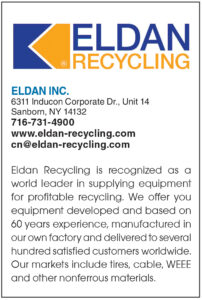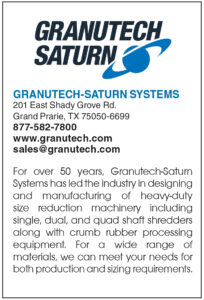ManufacturerAmerican Baler American Pulverizer Bano Recycling s.r.l. BCA Industries Danieli Centro Recycling Eldan Recycling A/S Erdwich Zerkleinerungs-Systeme GmbH Forrec Recycling Franklin Miller, Inc. Granutech-Saturn Systems Hammermills International, LLC Harris Waste Management Komar Industries, LLC Lindner Recyclingtech America Texas Shredder Lindemann Riverside Engineering, Inc. Shred-Tech Sicon America SSI Shredding Systems, Inc. UNTHA Shredding Technology Inc. Weima America, Inc. Zato North America |
by MARY M. THORNTON
Scrap metal recycling involves collecting, sorting, processing and recycling discarded metal materials into useful raw materials. Various factors shape this market – economic viability, environmental benefits and energy savings that may result. Valued at $407.02 billion in 2023, and according to Fortune Business Insights, the market is projected to grow to $568.76 billion by 2032. The following describes some of the products used by businesses that process scrap metals.
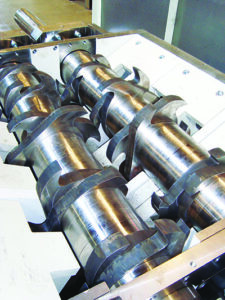
Erdwich
Erdwich develops recycling lines specifically for metals found in e-waste, including seamlessly integrated shredding systems like the fully automated RM1350 two-shaft ripper. With around 30 million tons of e-waste generated in 2022, Asia is the world’s largest producer of this valuable resource, but in a per capita comparison, Europe takes the lead. In Germany, each person produces an average of 18 kg per year and this includes battery-powered children’s toys to telephones, computers, monitors and televisions to large household appliances such as washing machines and dryers. These common items contain valuable raw materials such as copper, silver, gold, lithium, cobalt and rare earths, which are very complex and expensive to mine. Also, these finite resources and their natural deposits are constantly dwindling.
To help capture these valuable resources, the EU’s goal is that 65 percent of all electrical devices put into circulation will then be returned to the production cycle – although Germany is 20 percentage points away from this target. “Part of the reason for this is that e-waste processing is quite challenging,” said Erdwich managing director, Harald Erdwich. “Appliances consist of many different materials and components, which first must be laboriously dismantled and separated. In addition, older refrigerators, for example, also contain harmful substances such as CFCs (chlorofluorocarbons), which under no circumstances may be allowed to escape into the atmosphere. Furthermore, many old devices hold toxic and environmentally hazardous substances such as lead or mercury.”
After initial sorting, e-waste collected for recycling is first pre-shredded. The process turns individual parts into a slightly more homogeneous mass, which facilitates further separation of the individual components and materials. For this purpose, Erdwich has developed the RM1350 shredder for coarse materials, which can be retrofitted into existing recycling lines. The length of the cutting unit of the two-shaft ripper can be configured between 1,500, 2,000 and 2,500 mm to precisely match the input consisting of electrical devices, as can the electromechanical drive power of 45 to 132 kW, including a frequency converter for individually setting the shaft speeds. Depending on the size and material composition of the processed electrical devices, a throughput of up to 5 t/h is possible.
“The individually inserted knives made of wear-resistant special steel allow for different narrow and wide cutting sequences and blade arrangements,” explained Erdwich. “In this way, I can ensure an optimum shredding result as the basis for subsequent material separation and recovery processes.” The smaller and more homogeneous the remaining parts are, the faster and with less energy plastics and other organic components can be separated from valuable metals. However, to prevent breakdowns and system downtimes when handling particularly bulky, large, electrical devices, the fully automatic two-shaft ripper is equipped with a specially developed PLC including automatic reversing and shutdown.
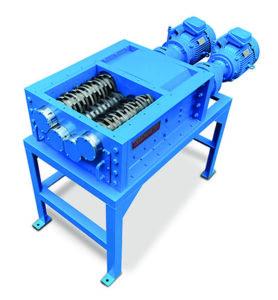
Franklin Miller
Franklin Miller, a leader in size reduction technology for over a century, offers a comprehensive range of industrial shredders, designed to meet the demanding requirements of various material processing applications. “Our durable, high-quality shredding machines efficiently handle a wide variety of materials – from electronic and some other metal waste, plastics, and glass to larger items like car tires and wood. Engineered for versatility and reliability, our industrial shredders are invaluable assets for businesses seeking efficient and effective material size reduction solutions,” Bill Galanty, president, stated. He added that Franklin Miller has developed a new, versatile shredder designed for applications that demand consistent particle sizing. The Taskmaster® QS Quad Shaft Shredder boasts a four-shaft system that efficiently processes metal and other materials into a uniform size, ideal for recycling and waste-to-energy endeavors.
The QS “excels in diverse shredding applications and equipped with hardened precision cutters and planetary reducers, ensures reliable performance. Optional stands, hoppers, and bulk feed capabilities adapt to specific application needs, as does a sealed system for handling liquids or submerged cutting chamber applications.
The heavy duty construction of the machine includes rugged hex shafts, gears, and spline components, ensuring durability and top-tier performance. The unique design of the QS allows it to efficiently reduce a high volume of solids with its low-speed, high-torque mechanism, resulting in the reduction of material volume for further processing or economical disposal. Solids pass through a special sizing screen and recirculate within the cutting area, ensuring a uniform particle output for precise sizing. The shredder’s design also features effective operation while producing minimal noise, dust, or heat generation. Built with quality components and engineering excellence, the Taskmaster provides superior performance and reliability, meeting the demands of industrial shredding requirements.
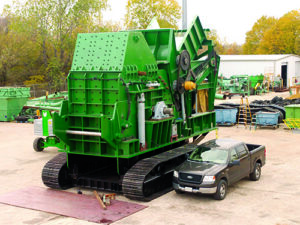
Granutech-Saturn Systems
Granutech-Saturn Systems manufactures a wide range of shredding technologies for both ferrous and nonferrous metals. Their line of single shaft, dual shaft and quad shaft shredders are well suited for applications of nonferrous and light ferrous items such as copper, aluminum, or steel drums and white goods. Granutech has acquired full ownership in 3TEK, a company that was previously only partially owned by Granutech. The 3TEK product offering consists of two different sizes of track mounted portable hammermills, diesel or electric drive, capable of processing scrap metals including cars as well as downstream systems. “Brining 3TEK in to the Granutech umbrella enables us to offer an extremely wide range of solutions for most metals. Whether it is granulating nonferrous metals such as copper and aluminum or shredding automobiles, the product offering of Granutech has you covered.”
Published in the December 2024 Edition of American Recycler News









